Unit 10 I'd like some noodles.(SectionA Grammar-3c)课件 (共34张PPT)
文档属性
| 名称 | Unit 10 I'd like some noodles.(SectionA Grammar-3c)课件 (共34张PPT) | 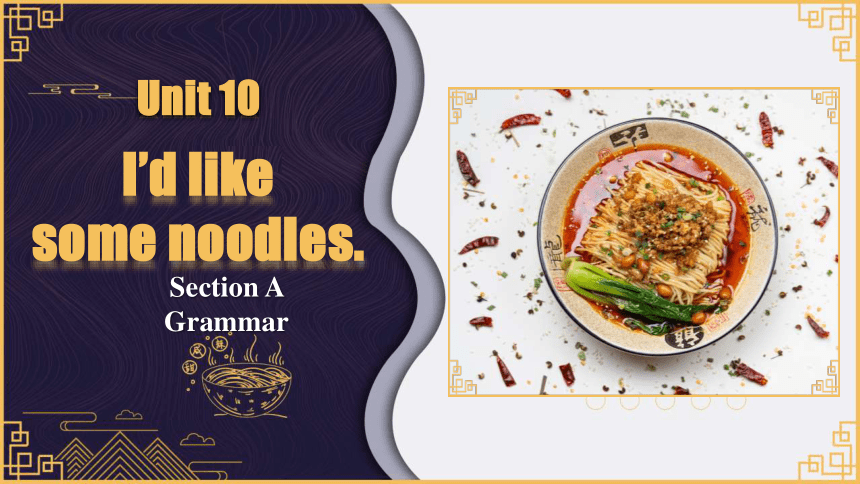 | |
| 格式 | pptx | ||
| 文件大小 | 58.4MB | ||
| 资源类型 | 教案 | ||
| 版本资源 | 人教新目标(Go for it)版 | ||
| 科目 | 英语 | ||
| 更新时间 | 2022-05-23 12:43:06 | ||
图片预览

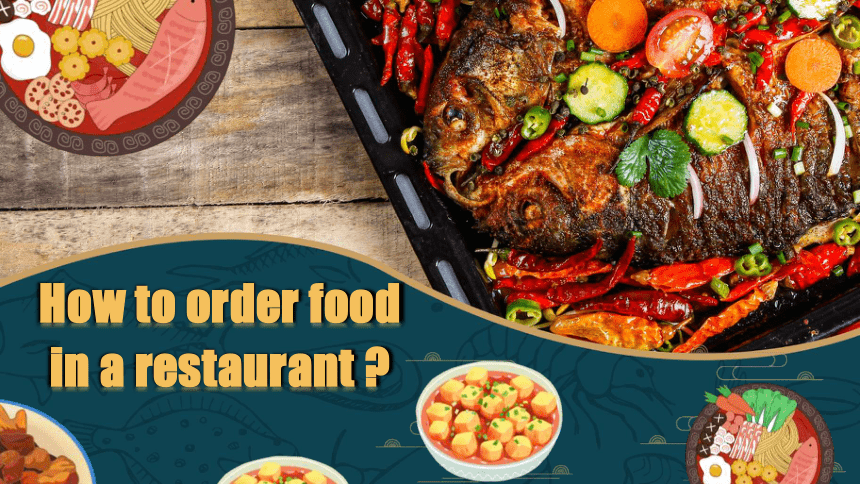
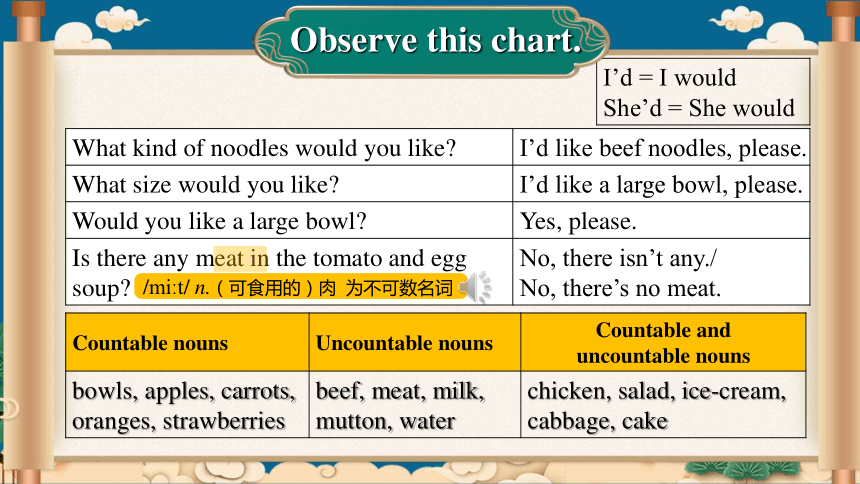
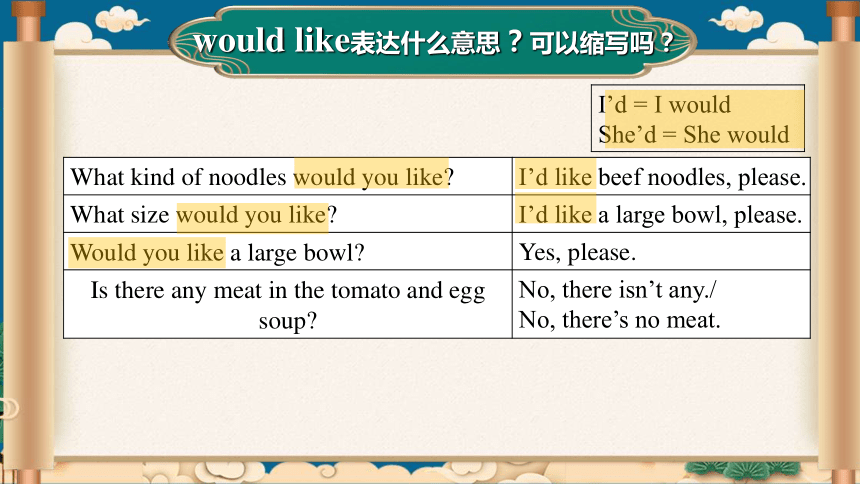
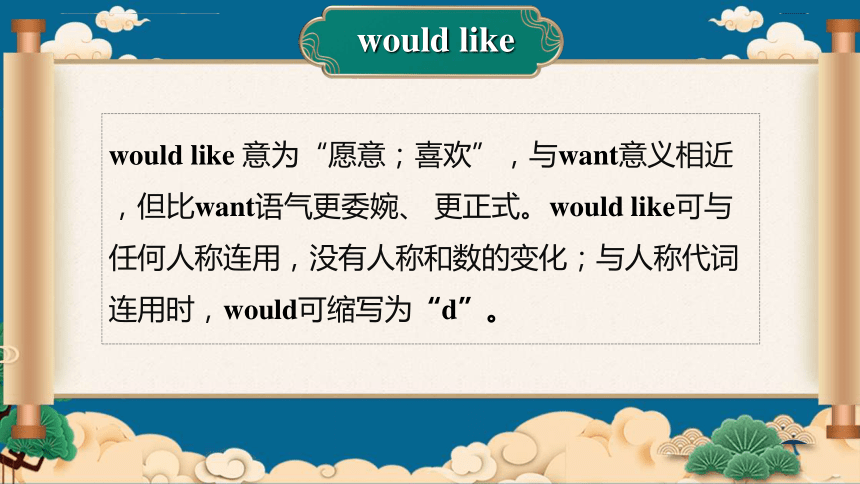
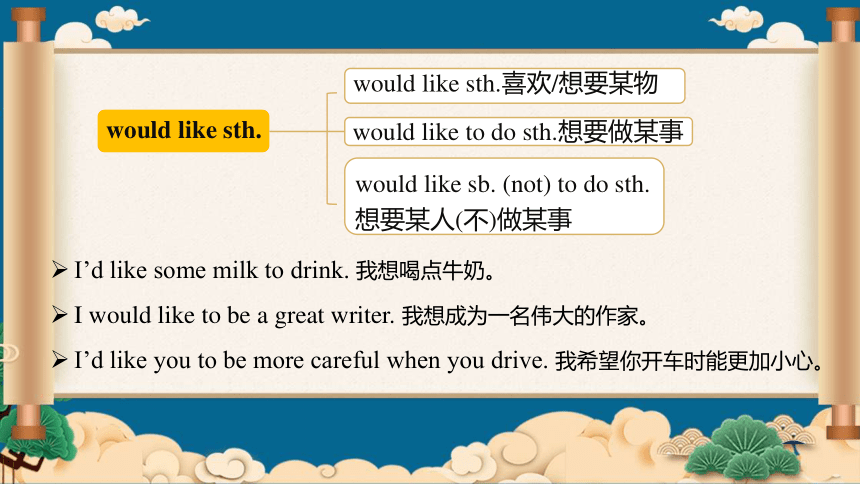
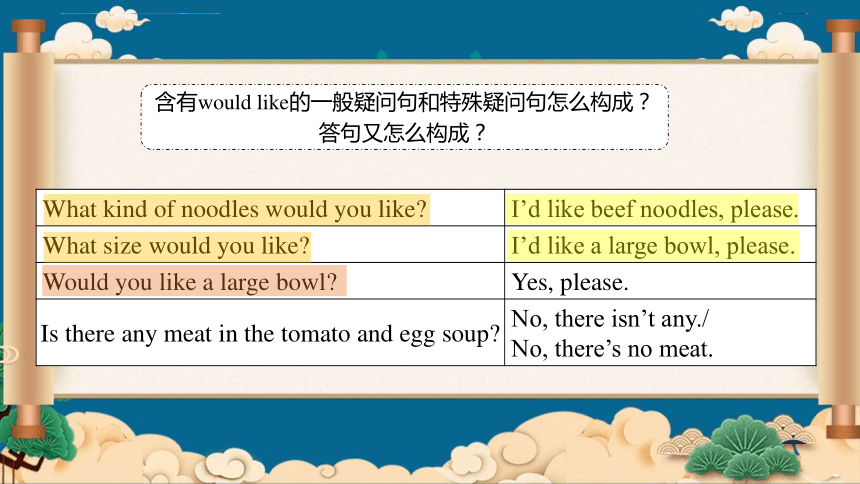
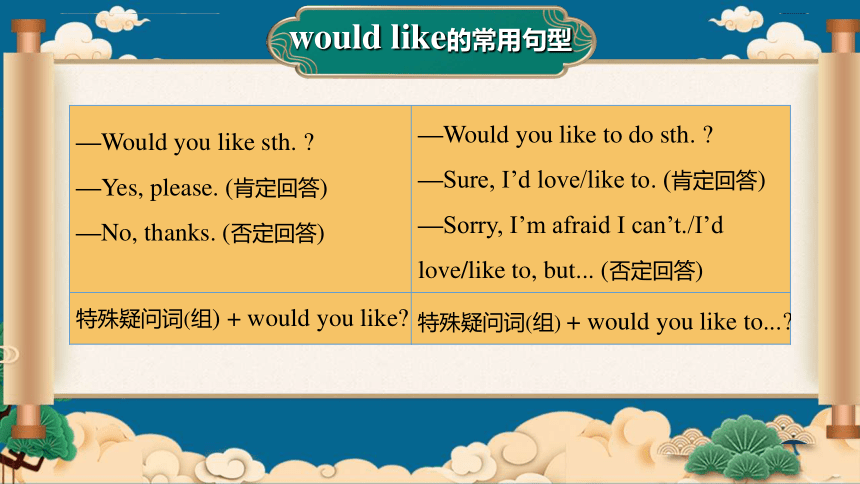
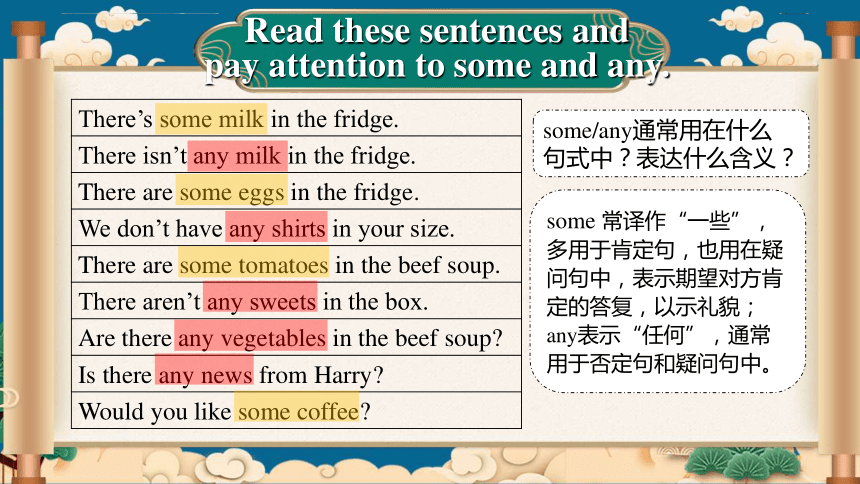
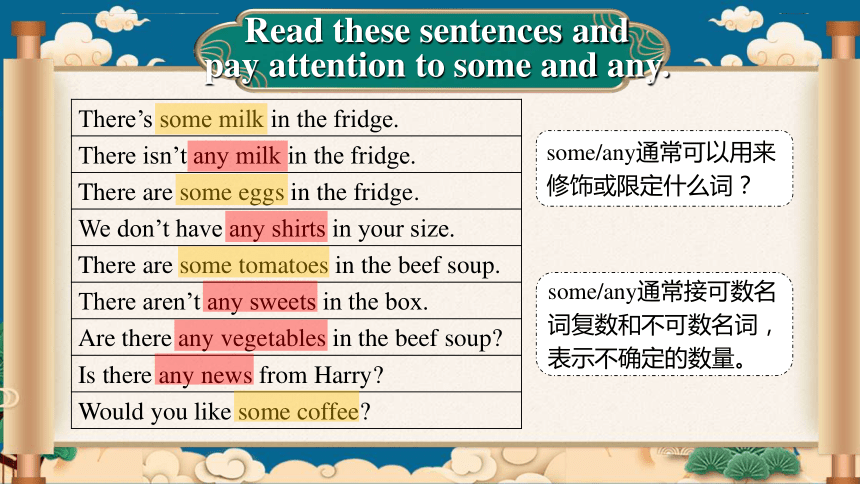
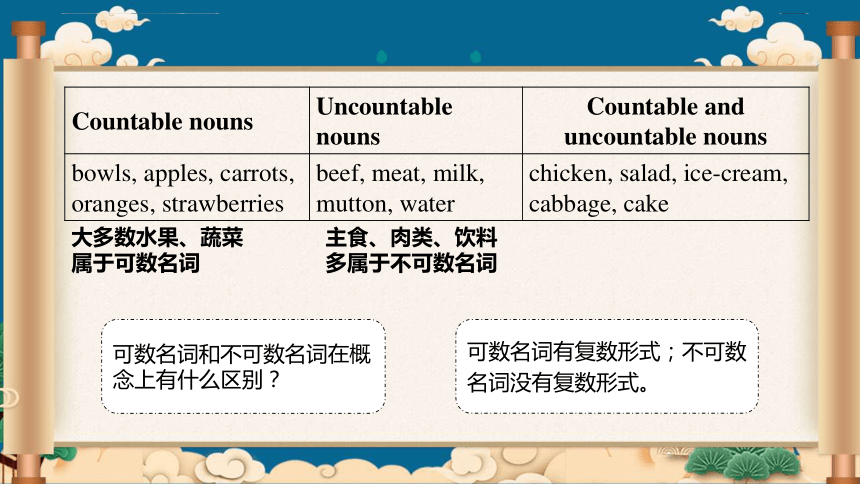
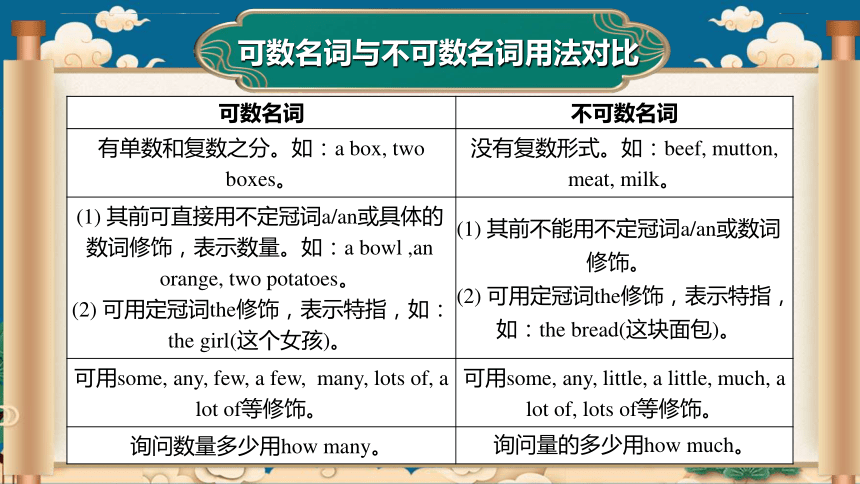
文档简介
(共34张PPT)
Section A Grammar
Unit 10
I’d like
some noodles.
How to order food
in a restaurant
What kind of noodles would you like I’d like beef noodles, please.
What size would you like I’d like a large bowl, please.
Would you like a large bowl Yes, please.
Is there any meat in the tomato and egg soup No, there isn’t any./
No, there’s no meat.
/mi t/ n.(可食用的)肉 为不可数名词
Countable nouns Uncountable nouns Countable and
uncountable nouns
bowls, apples, carrots, oranges, strawberries beef, meat, milk, mutton, water chicken, salad, ice-cream,
cabbage, cake
I’d = I would
She’d = She would
Observe this chart.
What kind of noodles would you like I’d like beef noodles, please.
What size would you like I’d like a large bowl, please.
Would you like a large bowl Yes, please.
Is there any meat in the tomato and egg soup No, there isn’t any./
No, there’s no meat.
I’d = I would
She’d = She would
would like表达什么意思?可以缩写吗?
would like
would like 意为“愿意;喜欢”,与want意义相近,但比want语气更委婉、 更正式。would like可与任何人称连用,没有人称和数的变化;与人称代词连用时,would可缩写为“d”。
would like sth.
would like sth.喜欢/想要某物
would like to do sth.想要做某事
would like sb. (not) to do sth.
想要某人(不)做某事
I’d like some milk to drink. 我想喝点牛奶。
I would like to be a great writer. 我想成为一名伟大的作家。
I’d like you to be more careful when you drive. 我希望你开车时能更加小心。
What kind of noodles would you like I’d like beef noodles, please.
What size would you like I’d like a large bowl, please.
Would you like a large bowl Yes, please.
Is there any meat in the tomato and egg soup No, there isn’t any./
No, there’s no meat.
含有would like的一般疑问句和特殊疑问句怎么构成?答句又怎么构成?
would like的常用句型
—Would you like sth. —Yes, please. (肯定回答) —No, thanks. (否定回答) —Would you like to do sth.
—Sure, I’d love/like to. (肯定回答)
—Sorry, I’m afraid I can’t./I’d love/like to, but... (否定回答)
特殊疑问词(组) + would you like 特殊疑问词(组) + would you like to...
Read these sentences and
pay attention to some and any.
There’s some milk in the fridge.
There isn’t any milk in the fridge.
There are some eggs in the fridge.
We don’t have any shirts in your size.
There are some tomatoes in the beef soup.
There aren’t any sweets in the box.
Are there any vegetables in the beef soup
Is there any news from Harry
Would you like some coffee
some/any通常用在什么
句式中?表达什么含义?
some 常译作“一些”,多用于肯定句,也用在疑问句中,表示期望对方肯定的答复,以示礼貌; any表示“任何”,通常用于否定句和疑问句中。
Read these sentences and
pay attention to some and any.
There’s some milk in the fridge.
There isn’t any milk in the fridge.
There are some eggs in the fridge.
We don’t have any shirts in your size.
There are some tomatoes in the beef soup.
There aren’t any sweets in the box.
Are there any vegetables in the beef soup
Is there any news from Harry
Would you like some coffee
some/any通常可以用来修饰或限定什么词?
some/any通常接可数名词复数和不可数名词,表示不确定的数量。
Countable nouns Uncountable nouns Countable and
uncountable nouns
bowls, apples, carrots, oranges, strawberries beef, meat, milk, mutton, water chicken, salad, ice-cream,
cabbage, cake
大多数水果、蔬菜属于可数名词
主食、肉类、饮料多属于不可数名词
可数名词和不可数名词在概念上有什么区别?
可数名词有复数形式;不可数名词没有复数形式。
可数名词与不可数名词用法对比
可数名词 不可数名词
有单数和复数之分。如:a box, two boxes。 没有复数形式。如:beef, mutton, meat, milk。
(1) 其前可直接用不定冠词a/an或具体的数词修饰,表示数量。如:a bowl ,an orange, two potatoes。 (2) 可用定冠词the修饰,表示特指,如:the girl(这个女孩)。 (1) 其前不能用不定冠词a/an或数词修饰。
(2) 可用定冠词the修饰,表示特指,如:the bread(这块面包)。
可用some, any, few, a few, many, lots of, a lot of等修饰。 可用some, any, little, a little, much, a lot of, lots of等修饰。
询问数量多少用how many。 询问量的多少用how much。
不可数名词量的表达
不可数名词的量可以用 “a/an/基数词+表示量的名词 + of + 不可数名词” 表示,这些表示量的名词有单复数形式的变化。这一结构作主语时,谓语动词的单复数形式要与表示量的名词保持一致。
There is a bottle of juice on the table. 桌子上有一瓶果汁。(谓语动词is与a bottle保持一致)
There are three bowls of mutton soup on the table. 桌子上有三碗羊肉汤。(谓语动词are与three bowls保持一致)
Translate the sentences and pay
attention to the red words.
a. They keep a chicken in the back yard.
____________________________________
b. Would you like some chicken
____________________________________
c. There are three cabbages in the kitchen.
____________________________________
d. There is no cabbage in the soup.
____________________________________
他们在后院养了一只鸡。
你想吃鸡肉吗?
厨房里有三颗卷心菜。
汤里没有卷心菜。
chicken作“鸡肉”讲时是不可数名词。
chicken作“小鸡”讲时是可数名词。
cabbage作“卷心菜”讲时是可数名词。
cabbage作“卷心菜(的物质)”讲时是不可数名词。
Complete the
conversation below.
3a
1. May I have your order ___
2. What kind of noodles would you
like ___
3. We have beef, chicken, mutton,
cabbage, potato, tomato... ___
4. Yes, there are some carrots. ___
5. Sure. What size would you like ___
6. We have large, medium and small
bowls. ___
a. What kind of noodles do you have
b. Oh, a medium bowl, please.
c. OK, I’d like the mutton noodles then.
d. I’d like some noodles, please.
e. What sizes do you have
f. Are there any vegetables in the
mutton noodles
d
a
f
c
e
b
Write questions and answers
using the words in brackets.
3b
1._________________________________________
_________________________________________
2._________________________________________ (size)
_________________________________________ (medium)
3._________________________________________ (any/cabbage/beef noodles)
_________________________________________ (no)
(chicken/beef/tomatoes)
What kind of noodles would you like (kind)
I’d like chicken and beef noodles with tomatoes.
What size would you like
I’d like a medium bowl, please.
Is there any cabbage in the beef noodles
No, there isn’t any.
Look at the pictures and match the pictures with the food.
_____ _____ ______ ______
c
d
a
b
c. hamburger
d. potato salad
a. tomato and
egg rice
b. beef and
carrot noodles
Work in small groups.
Who would like the food below
Write their names on the cards above the food.
3c
Anna, what would you like to eat
I’d like beef and carrot noodles.
Make a report about
their choice in your group.
In our group, Sally and Tom would like some hamburgers. Anna and Jim would like tomato and egg rice. Nobody would like potato salad.
...
would like
1. What would you like 您需要什么? (教材P55 图片文字)
would like和want表示“要;想要”,但两者语气上差别较大。前者礼貌委婉、正式规范,后者直接、非正式且随意。
I’d like a cup of black tea with milk, please. 请给我来杯加奶的红茶。
I want some hot tea, Mom. 妈妈,我想喝些热茶。
What do you want to eat today, children 孩子们,今天你们
想吃些什么?
What would you like to order, sir 先生,您想点些什么?
Point
Language points
Language points
1. What would you like 您需要什么? (教材P55 图片文字)
would like
Point
would like和want表示“要;想要”,但两者语气上差别较大。前者礼貌委婉、正式规范,后者直接、非正式且随意。
I’d like a cup of black tea with milk, please. 请给我来杯加奶的红茶。
I want some hot tea, Mom. 妈妈,我想喝些热茶。
What do you want to eat today, children 孩子们,今天你们
想吃些什么?
What would you like to order, sir 先生,您想点些什么?
Language points
Language points
special n.特色菜;特价品 adj. 特别的;特殊的
2. Special 1 1号特色面 (教材P55 1b)
【用法详解】(1) special 在此处作名词,意为“特色菜;特价品”。
Special 2 is my favorite. 2号特色菜是我最喜欢的。
What is your special today 今天你们的特价品是什么
(2) special 还可作形容词,意为“特别的;特殊的”。其副词形式为
specially,意为“专门地;特意;特别”。
It’s a special day for me. 今天对我来说是个特殊的日子。
We come specially to see you. 我们特意来看你。
Point
Language points
Language points
order n.& v. 点菜;命令
3. May I take your order 请问您可以点菜了吗? (教材P56 2d)
【用法详解】(1) order 在句中作名词,意为“点菜”。 take one’s
order 表示“点菜”。
We can take our orders on the phone. 我们可以通过电话订餐。
(2) order 作名词,还可意为“命令;指示”。give orders 意为
“下命令”;take orders 意为“听从命令”。
She takes orders only from her father. 她只听从她父亲的吩咐。
Point1
Language points
Language points
【拓展延伸】order的其他用法:
(1) 作动词,意为“点菜;订购”。
He sat down and ordered a meal. 他坐下来点了餐。
Nowadays, many people like to order things on line. 现在,许多人喜欢在网上订购物品。
(2) 作动词,意为“命令”。 order sb. to do sth. 表示“命令某人做
某事”。
The policeman ordered him to stay here. 警察命令他待在这儿。
(3) 作名词,意为“条理;顺序”。
Please put all the books back in the right order before you leave. 在你离开之前,请把所有的书按照正确的顺序放回。
Language points
Language points
【用法详解】 “May I take your order ” 是服务员询问顾客是否可以
开始点餐的交际用语。
— May I take your order 您可以点菜了吗
— Yes, I’d like a cup of coffee, please. 是的,请给我来一杯咖啡。
May I take your order
Point2
4. May I take your order 请问您可以点菜了吗? (教材P56 2d)
Language points
Language points
【拓展延伸】点餐时服务员的常用表达还有:
Are you ready to order 你可以点餐了吗?What would you like 你想吃(喝)些什么?Here’s the menu. 给您菜单。
May I/we have the menu, please 我(们)可以看一下菜单吗?
I’d like to order... 我想点……
We’d like… 我们想要……
点餐时顾客的常用表达有:
Language points
Language points
【用法详解】 “What size… ”用于询问型号大小或尺码。其中size是名词,意为“大小;尺码”,既可指物体、面积或规模的大小,也可指鞋、衣服等的尺寸、尺码。
5. What size would you like 你们想要多大碗的? (教材P56 2d)
询问型号、尺码的句型
Point
衣服的尺码通常有L、M、S三种。 L代表large(大号的);M代表medium(中号的);S代表small(小号的)。
—What size does he wear 他穿多大尺码的?
—Size M. M码的。
I take size 8 in shoes. 我穿8码鞋。
Language points
Language points
6. One large bowl of beef soup…一份大碗牛肉汤…… (教材P56 2d)
large adj. 大号的;大的
Point
large 意为“大号的;大的”,多指客观上规模、体积、容量或数目大。 Can you see the large building 你能看到那个大型建筑物吗?
big 意为“大的”,既可指客观上规模或体积大,也可指身材高大或地位重要。 There is a big tree in front of my house. 我家房前有一棵大树。
I have a big plan for the weekend. 我周末有一个重大计划。
【易混辨析】large与big
Language points
Exercises
一、根据汉语及首字母提示填单词
She w_______ like to spend the holiday with her parents.
Please give me a large b_______ of noodles.
Here is the menu(菜单). You can o_______ your food.
There are some _______ (土豆).
I’d like beef _______ (面条).
There is a _______ (大的) dining hall in our school.
1
2
3
4
5
ould
owl
rder
noodles
potatoes
large
6
I’d like noodles with _________ (potato) and beef.
There _________ (be) some chicken in the bowl.
We have different _________ (kind)of specials.
I’d like chicken and _________ (cabbage) noodles.
There are many _________ (carrot) in the soup.
二、用所给单词的正确形式填空
1
2
3
4
5
potatoes
is
kinds
carrots
cabbage
Exercises
Exercises
— We have large bowls and small bowls. What _____ would
you like
— A large bowl.
A. kind B. size C. color D. fruit
— ______________
— Yes, I’d like some dumplings and a glass of juice.
A. What do you like B. May I take your order
C. How is it going D. When do you want to eat
三、单项选择
1
2
B
B
Exercises
There is some ______ on the table.
A. potato B. egg C. tomato D. beef
D
3
—Would you like ______ shopping with me
—Yes, I’d love to.
A. go B. to go C. going D. goes
4
B
The workers would like many ______ for supper, because they keep carrying things all the afternoon.
A. bowl of noodle B. bowls of noodles
C. bowl of noodles D. bowls of noodle
5
B
Summary
Unit 10 I’d like some noodles. (Section A1a-2d)
would like, take one’s order, one (large) bowl of
能正确使用would like
能正确使用不定代词some, any
Expressions
Grammar
New words
能分辨并能正确使用可数名词和不可数名词
noodles, mutton, beef, cabbage, potato, special, would, yet, large, order, size, bowl, tofu
能正确使用what引导的特殊疑问句
Summary
— What would you like
— I’d like some noodles.
— What kind of noodles would you like
— I’d like a small bowl.
— What size would you like
— I’d like beef noodles, please.
Sentences
— Yes. There are some tomatoes.
— Are there any vegetables in the beef soup
Homework
假如你去一家面馆吃面,服务员问你想吃什么面,吃多大碗的,你告诉他说想要鸡肉洋白菜的,要中碗的。把你们之间的对话用英语写下来,至少6句话。
These sentences may help you
May I take your order
What kind of noodles would you like
What size would you like
Is there any cabbage in it
I’d like…
Section A Grammar
Unit 10
I’d like
some noodles.
How to order food
in a restaurant
What kind of noodles would you like I’d like beef noodles, please.
What size would you like I’d like a large bowl, please.
Would you like a large bowl Yes, please.
Is there any meat in the tomato and egg soup No, there isn’t any./
No, there’s no meat.
/mi t/ n.(可食用的)肉 为不可数名词
Countable nouns Uncountable nouns Countable and
uncountable nouns
bowls, apples, carrots, oranges, strawberries beef, meat, milk, mutton, water chicken, salad, ice-cream,
cabbage, cake
I’d = I would
She’d = She would
Observe this chart.
What kind of noodles would you like I’d like beef noodles, please.
What size would you like I’d like a large bowl, please.
Would you like a large bowl Yes, please.
Is there any meat in the tomato and egg soup No, there isn’t any./
No, there’s no meat.
I’d = I would
She’d = She would
would like表达什么意思?可以缩写吗?
would like
would like 意为“愿意;喜欢”,与want意义相近,但比want语气更委婉、 更正式。would like可与任何人称连用,没有人称和数的变化;与人称代词连用时,would可缩写为“d”。
would like sth.
would like sth.喜欢/想要某物
would like to do sth.想要做某事
would like sb. (not) to do sth.
想要某人(不)做某事
I’d like some milk to drink. 我想喝点牛奶。
I would like to be a great writer. 我想成为一名伟大的作家。
I’d like you to be more careful when you drive. 我希望你开车时能更加小心。
What kind of noodles would you like I’d like beef noodles, please.
What size would you like I’d like a large bowl, please.
Would you like a large bowl Yes, please.
Is there any meat in the tomato and egg soup No, there isn’t any./
No, there’s no meat.
含有would like的一般疑问句和特殊疑问句怎么构成?答句又怎么构成?
would like的常用句型
—Would you like sth. —Yes, please. (肯定回答) —No, thanks. (否定回答) —Would you like to do sth.
—Sure, I’d love/like to. (肯定回答)
—Sorry, I’m afraid I can’t./I’d love/like to, but... (否定回答)
特殊疑问词(组) + would you like 特殊疑问词(组) + would you like to...
Read these sentences and
pay attention to some and any.
There’s some milk in the fridge.
There isn’t any milk in the fridge.
There are some eggs in the fridge.
We don’t have any shirts in your size.
There are some tomatoes in the beef soup.
There aren’t any sweets in the box.
Are there any vegetables in the beef soup
Is there any news from Harry
Would you like some coffee
some/any通常用在什么
句式中?表达什么含义?
some 常译作“一些”,多用于肯定句,也用在疑问句中,表示期望对方肯定的答复,以示礼貌; any表示“任何”,通常用于否定句和疑问句中。
Read these sentences and
pay attention to some and any.
There’s some milk in the fridge.
There isn’t any milk in the fridge.
There are some eggs in the fridge.
We don’t have any shirts in your size.
There are some tomatoes in the beef soup.
There aren’t any sweets in the box.
Are there any vegetables in the beef soup
Is there any news from Harry
Would you like some coffee
some/any通常可以用来修饰或限定什么词?
some/any通常接可数名词复数和不可数名词,表示不确定的数量。
Countable nouns Uncountable nouns Countable and
uncountable nouns
bowls, apples, carrots, oranges, strawberries beef, meat, milk, mutton, water chicken, salad, ice-cream,
cabbage, cake
大多数水果、蔬菜属于可数名词
主食、肉类、饮料多属于不可数名词
可数名词和不可数名词在概念上有什么区别?
可数名词有复数形式;不可数名词没有复数形式。
可数名词与不可数名词用法对比
可数名词 不可数名词
有单数和复数之分。如:a box, two boxes。 没有复数形式。如:beef, mutton, meat, milk。
(1) 其前可直接用不定冠词a/an或具体的数词修饰,表示数量。如:a bowl ,an orange, two potatoes。 (2) 可用定冠词the修饰,表示特指,如:the girl(这个女孩)。 (1) 其前不能用不定冠词a/an或数词修饰。
(2) 可用定冠词the修饰,表示特指,如:the bread(这块面包)。
可用some, any, few, a few, many, lots of, a lot of等修饰。 可用some, any, little, a little, much, a lot of, lots of等修饰。
询问数量多少用how many。 询问量的多少用how much。
不可数名词量的表达
不可数名词的量可以用 “a/an/基数词+表示量的名词 + of + 不可数名词” 表示,这些表示量的名词有单复数形式的变化。这一结构作主语时,谓语动词的单复数形式要与表示量的名词保持一致。
There is a bottle of juice on the table. 桌子上有一瓶果汁。(谓语动词is与a bottle保持一致)
There are three bowls of mutton soup on the table. 桌子上有三碗羊肉汤。(谓语动词are与three bowls保持一致)
Translate the sentences and pay
attention to the red words.
a. They keep a chicken in the back yard.
____________________________________
b. Would you like some chicken
____________________________________
c. There are three cabbages in the kitchen.
____________________________________
d. There is no cabbage in the soup.
____________________________________
他们在后院养了一只鸡。
你想吃鸡肉吗?
厨房里有三颗卷心菜。
汤里没有卷心菜。
chicken作“鸡肉”讲时是不可数名词。
chicken作“小鸡”讲时是可数名词。
cabbage作“卷心菜”讲时是可数名词。
cabbage作“卷心菜(的物质)”讲时是不可数名词。
Complete the
conversation below.
3a
1. May I have your order ___
2. What kind of noodles would you
like ___
3. We have beef, chicken, mutton,
cabbage, potato, tomato... ___
4. Yes, there are some carrots. ___
5. Sure. What size would you like ___
6. We have large, medium and small
bowls. ___
a. What kind of noodles do you have
b. Oh, a medium bowl, please.
c. OK, I’d like the mutton noodles then.
d. I’d like some noodles, please.
e. What sizes do you have
f. Are there any vegetables in the
mutton noodles
d
a
f
c
e
b
Write questions and answers
using the words in brackets.
3b
1._________________________________________
_________________________________________
2._________________________________________ (size)
_________________________________________ (medium)
3._________________________________________ (any/cabbage/beef noodles)
_________________________________________ (no)
(chicken/beef/tomatoes)
What kind of noodles would you like (kind)
I’d like chicken and beef noodles with tomatoes.
What size would you like
I’d like a medium bowl, please.
Is there any cabbage in the beef noodles
No, there isn’t any.
Look at the pictures and match the pictures with the food.
_____ _____ ______ ______
c
d
a
b
c. hamburger
d. potato salad
a. tomato and
egg rice
b. beef and
carrot noodles
Work in small groups.
Who would like the food below
Write their names on the cards above the food.
3c
Anna, what would you like to eat
I’d like beef and carrot noodles.
Make a report about
their choice in your group.
In our group, Sally and Tom would like some hamburgers. Anna and Jim would like tomato and egg rice. Nobody would like potato salad.
...
would like
1. What would you like 您需要什么? (教材P55 图片文字)
would like和want表示“要;想要”,但两者语气上差别较大。前者礼貌委婉、正式规范,后者直接、非正式且随意。
I’d like a cup of black tea with milk, please. 请给我来杯加奶的红茶。
I want some hot tea, Mom. 妈妈,我想喝些热茶。
What do you want to eat today, children 孩子们,今天你们
想吃些什么?
What would you like to order, sir 先生,您想点些什么?
Point
Language points
Language points
1. What would you like 您需要什么? (教材P55 图片文字)
would like
Point
would like和want表示“要;想要”,但两者语气上差别较大。前者礼貌委婉、正式规范,后者直接、非正式且随意。
I’d like a cup of black tea with milk, please. 请给我来杯加奶的红茶。
I want some hot tea, Mom. 妈妈,我想喝些热茶。
What do you want to eat today, children 孩子们,今天你们
想吃些什么?
What would you like to order, sir 先生,您想点些什么?
Language points
Language points
special n.特色菜;特价品 adj. 特别的;特殊的
2. Special 1 1号特色面 (教材P55 1b)
【用法详解】(1) special 在此处作名词,意为“特色菜;特价品”。
Special 2 is my favorite. 2号特色菜是我最喜欢的。
What is your special today 今天你们的特价品是什么
(2) special 还可作形容词,意为“特别的;特殊的”。其副词形式为
specially,意为“专门地;特意;特别”。
It’s a special day for me. 今天对我来说是个特殊的日子。
We come specially to see you. 我们特意来看你。
Point
Language points
Language points
order n.& v. 点菜;命令
3. May I take your order 请问您可以点菜了吗? (教材P56 2d)
【用法详解】(1) order 在句中作名词,意为“点菜”。 take one’s
order 表示“点菜”。
We can take our orders on the phone. 我们可以通过电话订餐。
(2) order 作名词,还可意为“命令;指示”。give orders 意为
“下命令”;take orders 意为“听从命令”。
She takes orders only from her father. 她只听从她父亲的吩咐。
Point1
Language points
Language points
【拓展延伸】order的其他用法:
(1) 作动词,意为“点菜;订购”。
He sat down and ordered a meal. 他坐下来点了餐。
Nowadays, many people like to order things on line. 现在,许多人喜欢在网上订购物品。
(2) 作动词,意为“命令”。 order sb. to do sth. 表示“命令某人做
某事”。
The policeman ordered him to stay here. 警察命令他待在这儿。
(3) 作名词,意为“条理;顺序”。
Please put all the books back in the right order before you leave. 在你离开之前,请把所有的书按照正确的顺序放回。
Language points
Language points
【用法详解】 “May I take your order ” 是服务员询问顾客是否可以
开始点餐的交际用语。
— May I take your order 您可以点菜了吗
— Yes, I’d like a cup of coffee, please. 是的,请给我来一杯咖啡。
May I take your order
Point2
4. May I take your order 请问您可以点菜了吗? (教材P56 2d)
Language points
Language points
【拓展延伸】点餐时服务员的常用表达还有:
Are you ready to order 你可以点餐了吗?What would you like 你想吃(喝)些什么?Here’s the menu. 给您菜单。
May I/we have the menu, please 我(们)可以看一下菜单吗?
I’d like to order... 我想点……
We’d like… 我们想要……
点餐时顾客的常用表达有:
Language points
Language points
【用法详解】 “What size… ”用于询问型号大小或尺码。其中size是名词,意为“大小;尺码”,既可指物体、面积或规模的大小,也可指鞋、衣服等的尺寸、尺码。
5. What size would you like 你们想要多大碗的? (教材P56 2d)
询问型号、尺码的句型
Point
衣服的尺码通常有L、M、S三种。 L代表large(大号的);M代表medium(中号的);S代表small(小号的)。
—What size does he wear 他穿多大尺码的?
—Size M. M码的。
I take size 8 in shoes. 我穿8码鞋。
Language points
Language points
6. One large bowl of beef soup…一份大碗牛肉汤…… (教材P56 2d)
large adj. 大号的;大的
Point
large 意为“大号的;大的”,多指客观上规模、体积、容量或数目大。 Can you see the large building 你能看到那个大型建筑物吗?
big 意为“大的”,既可指客观上规模或体积大,也可指身材高大或地位重要。 There is a big tree in front of my house. 我家房前有一棵大树。
I have a big plan for the weekend. 我周末有一个重大计划。
【易混辨析】large与big
Language points
Exercises
一、根据汉语及首字母提示填单词
She w_______ like to spend the holiday with her parents.
Please give me a large b_______ of noodles.
Here is the menu(菜单). You can o_______ your food.
There are some _______ (土豆).
I’d like beef _______ (面条).
There is a _______ (大的) dining hall in our school.
1
2
3
4
5
ould
owl
rder
noodles
potatoes
large
6
I’d like noodles with _________ (potato) and beef.
There _________ (be) some chicken in the bowl.
We have different _________ (kind)of specials.
I’d like chicken and _________ (cabbage) noodles.
There are many _________ (carrot) in the soup.
二、用所给单词的正确形式填空
1
2
3
4
5
potatoes
is
kinds
carrots
cabbage
Exercises
Exercises
— We have large bowls and small bowls. What _____ would
you like
— A large bowl.
A. kind B. size C. color D. fruit
— ______________
— Yes, I’d like some dumplings and a glass of juice.
A. What do you like B. May I take your order
C. How is it going D. When do you want to eat
三、单项选择
1
2
B
B
Exercises
There is some ______ on the table.
A. potato B. egg C. tomato D. beef
D
3
—Would you like ______ shopping with me
—Yes, I’d love to.
A. go B. to go C. going D. goes
4
B
The workers would like many ______ for supper, because they keep carrying things all the afternoon.
A. bowl of noodle B. bowls of noodles
C. bowl of noodles D. bowls of noodle
5
B
Summary
Unit 10 I’d like some noodles. (Section A1a-2d)
would like, take one’s order, one (large) bowl of
能正确使用would like
能正确使用不定代词some, any
Expressions
Grammar
New words
能分辨并能正确使用可数名词和不可数名词
noodles, mutton, beef, cabbage, potato, special, would, yet, large, order, size, bowl, tofu
能正确使用what引导的特殊疑问句
Summary
— What would you like
— I’d like some noodles.
— What kind of noodles would you like
— I’d like a small bowl.
— What size would you like
— I’d like beef noodles, please.
Sentences
— Yes. There are some tomatoes.
— Are there any vegetables in the beef soup
Homework
假如你去一家面馆吃面,服务员问你想吃什么面,吃多大碗的,你告诉他说想要鸡肉洋白菜的,要中碗的。把你们之间的对话用英语写下来,至少6句话。
These sentences may help you
May I take your order
What kind of noodles would you like
What size would you like
Is there any cabbage in it
I’d like…
同课章节目录
- Unit 1 Can you play the guitar?
- Section A
- Section B
- Unit 2 What time do you go to school?
- Section A
- Section B
- Unit 3 How do you get to school?
- Section A
- Section B
- Unit 4 Don't eat in class.
- Section A
- Section B
- Unit 5 Why do you like pandas?
- Section A
- Section B
- Unit 6 I'm watching TV.
- Section A
- Section B
- Review of Units 1-6
- Unit 7 It's raining!
- Section A
- Section B
- Unit 8 Is there a post office near here?
- Section A
- Section B
- Unit 9 What does he look like?
- Section A
- Section B
- Unit 10 I'd like some noodles.
- Section A
- Section B
- Unit 11 How was your school trip?
- Section A
- Section B
- Unit 12 What did you do last weekend?
- Section A
- Section B
